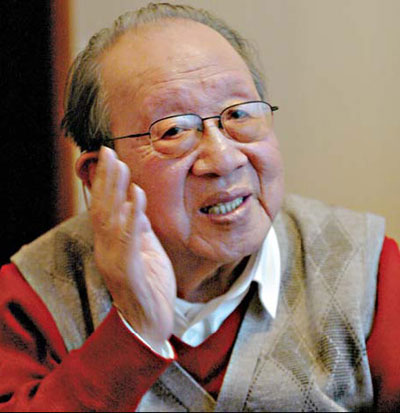Walking Dictionary of Flora
Updated: 2008-01-09 07:00
How many plants are there in China? What are their origins? What are their characteristics?
Only one man might have the ability and credibility to give the right answers.
 |
He is 92-year-old Wu Zhengyi (above), known as "Walking Dictionary of Chinese Flora". The botanist was one of two winners of this year's top science prize - the State Scientific and Technological Award - which was presented by President Hu Jintao Tuesday at the Great Hall of the People.
The professor and director emeritus of Kunming Institute of Botany (KIB) affiliated to the Chinese Academy of Sciences has devoted his life to research on Chinese and East Asian flora for more than 60 years and is one of the most renowned botanists in the world.
But Wu is humility personified. "My ability is very limited. If young scientists choose a steep road to climb, I am willing to be a stepping stone for them," the scientist said before he left Kunming for Beijing to receive the award.
To people who have learned from him, Wu, a native of Jiangxi who specializes in plant taxonomy, floristic geography, and the study of medicinal plants, is just too humble.
His knowledge of Latin names of more than 30,000 plant species spread across the country - especially East China - led him to being dubbed the "Walking Dictionary".
He spent 45 years from 1958 to 2004 editing Flora of China. Consisting of 80 volumes, 50 million words and more than 5,000 images, Wu's critical contributions make the book "the most comprehensive of its kind that characterizes plant species and distribution in China", the award review committee said.
The book not only has a complete inventory of Chinese plants and their communities for the first time, but also raised the reputation of Chinese botanical study in the world.
Wu found and named more plants than any other Chinese botanist, publishing 1,766 new species and genuses as author or co-author.
"If you gave a plant to Wu, he would immediately give its Latin name and its distribution, origin and use," Sun Hang, professor and deputy director of KIB who accompanied his teacher to Beijing, told China Daily.
"Some plant might be found in an area he has never been to. However, there was a good chance he could still name it because he is also the leading authority in plant biogeography in the country."
Wu was awarded the International Cosmos Prize, one of the most prestigious international prizes for botanists, in 1999 in recognition of his work that shed light on the basic concept of "coexistence of nature and man".
At 92, Wu is visually and hearing impaired and accepted the prize in a wheelchair. But he is still working on some new books.
As for the 5 million yuan ($684,000) award, he told Sun that he would donate it mainly for KIB's research with some portion for research on the Qinghai-Tibet Plateau.
|
|
|
||
|
||
|
|
|
|